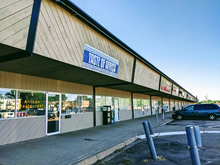Key takeaways
- Provide relevant technical assistance to local businesses
- Leverage existing relationships with local technical assistance providers
- Support minority-owned businesses
Technical assistance program supports local business owners
When businesses began closing at the onset of COVID-19, Brooklyn Center staff took immediate action to gather information about local business needs. They consulted with the Liberian Business Association of the Americas (LIBA) and the African Career, Education, and Resource, Inc. (ACER) — two organizations actively serving local businesses in the community. They also sought additional input from technical assistance providers in the Twin Cities, such as the National Development Council (NDC), WomenVenture, and the Metropolitan Consortium of Community Developers (MCCD).
It soon became clear that, while various governmental entities were providing a range of loan and grant resources, these resources were not reaching many small businesses. This was largely caused by a capacity bottleneck among technical assistance providers. Local banks also experienced a similar problem, often unable to process loan and grant applications for those who were not already existing customers.
During this time, local businesses — especially those that were newer or immigrant-owned — faced additional challenges with accessing available resources. Some did not use accounting practices that enabled them to provide proper financial records. Others were reluctant to apply for funds at all because they were skeptical governmental programs were truly intended to support small businesses like theirs.
To address these challenges, Brooklyn Center decided to fund services that would help local businesses access funding programs and adapt business practices to reach customers during the pandemic. The city contracted with grassroots business organizations they were already connected with — LIBA and ACER. They also partnered with another local technical service provider, the Minnesota African Coalition. Services began immediately, since the service providers already had existing relationships within the local business community. Two organizations were already under contract with the City of Brooklyn Center for a different project, so those contracts were simply amended to encompass the new initiative.
There were some challenges, however. Without systems of business licensure and registration in place at the City of Brooklyn Center, technical assistance providers sometimes had difficulty finding contact information for business owners. The period of civil unrest following the death of George Floyd divided the organizations’ attention for a time. It also led to the boarding up of some businesses, which made them difficult to reach. Despite these challenges, the providers’ persistence and existing local relationships allowed them to reach and support many of Brooklyn Center’s local business owners. Moreover, their mission orientation toward minority-owned businesses motivated them to reach many that were hardest hit by the pandemic.
Campaign success story
Brooklyn Center’s technical assistance program has served an estimated 50 businesses in the community. Services include supporting business owners with loan and grant application, transitioning to online sales, building online marketing capacity, and setting up Zoom calls.
The program has an overall budget of $60,000, which is divided between the three providers — LIBA, ACER, and the Minnesota African Coalition.
The technical assistance program is one of several business support actions the City of Brooklyn Center has taken in response to COVID-19. Other city initiatives include a forgivable loan program for small businesses, a small grant program for nonprofits, and supporting restaurants with expanding outdoor seating areas.
Who can you follow up with for more information about this project?
Meg Beekman, community development director, City of Brooklyn Center, mbeekman@ci.brooklyn-center.mn.us
Reviewed in 2020


